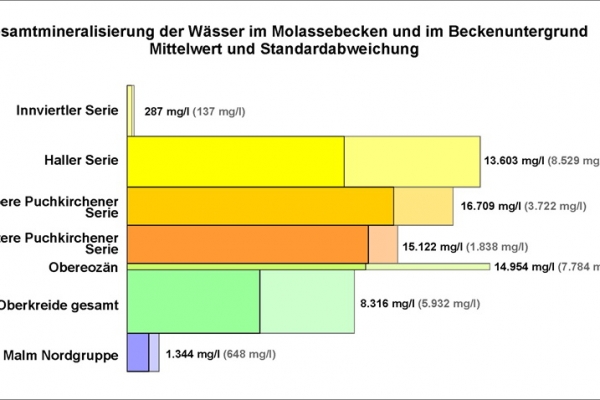Interreg IIIa-Projekt "TAT" Previous Next
Client:
Free state of Bavaria, Bavarian State Office for water management Republic of Austria, Federal ministry of agriculture and forestry State of Upper Austria, Department of water management, ground and drinking water managementM; Work group (ARGE TAT): Geoteam Ges.m.b.H. (A), Hydroconsult GmbH (D), Geowatt AG (CH)
Location:
Border area Lower Bavaria – Upper Austria
Time period:
2005 - 2007
Project:
Work group (ARGE TAT): Geoteam Ges.m.b.H. (A), Hydroconsult GmbH (D), Geowatt AG (CH)
General investigation in the course of an interregional project regarding the thermal effects of thermal water use related to the extraction and recirculation of thermal water in the area of the Lower Bavarian – Upper Austrian Molasse basin
Activities:
Project phase I - Basic data collection:
- Collection, inspection and evaluation of data
- Detailed demarcation and description of the area under investigation
- Identification and evaluation of essential chemical and physical parameters that define the thermal and hydraulic processes in the Malmkarst (aquiferous layer)
- Estimation of the effects of temperature changes on the gas content, the thermal water quality, the course of chemical and physical processes in the malm aquifer and their effects on hydraulic circumstances (evaluation of specialised literature)
Project phase II - Hydrogeological model:
- Updating the existing hydrogeological model of the investigation area; generating of a hydraulically calibrated model
- Generating of thermal hydrogeological models of the investigation area on the basis of the gathered and interpreted data. Estimating the heat pool and regeneration of extracted heat based on model concepts on the conductive and convective components of the heat flow. Schematisation (simplification) of the natural conditions, explanation and documentation of the schematisation process and working hypotheses.
Project phase III - Numerical and thermal/hydraulic groundwater model:
- Application of the numerical and thermal/hydraulic groundwater model
Development of principles for water management standards for an optimal exploitation of thermal water resources:
- Groundwater monitoring programme
- Setting up of thermal water measuring points
- Collection of data in the course of the future drillings


